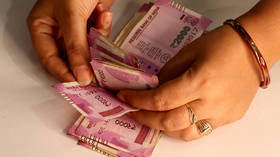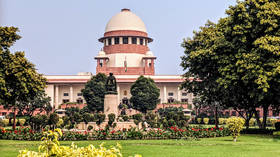Indian ‘Lottery King’ named in political donors scandal

A company owned by ‘Lottery King’ Santiago Martin has topped a list of India’s leading political donors in a scandal involving some of the country’s biggest parties. Electoral bonds, established to boost transparency in politics, were facilitated in a way that granted anonymity to the donors.
Future Gaming and Hotel Services cashed in a cumulative $165 million as part of the scheme, data released by the Election Commission on Thursday showed.
The ruling Bharatiya Janata Party (BJP) benefited most from the controversial program, receiving almost half of the bonds worth some Rs 120 billion ($1.4 billion) donated between 2018 and 2024.
The All India Trinamool Congress (TMC), which rules West Bengal state in eastern India, received Rs 16 billion ($193 million) in donations, ahead of the largest opposition party, the Congress, which was paid Rs 14 billion ($168 million).
Donations to India’s political parties were reportedly made between April 2019 and January 2024 using an electoral bonds scheme that allowed people and companies to remain anonymous.
Under the scheme, introduced by the Narendra Modi-led government in 2018, donors could buy the bonds in fixed denominations of up to $121,000 from branches of the government-run State Bank of India and give them to political parties to be exchanged for cash.
Last month, India’s Supreme Court banned the scheme and ordered the Election Commission to disclose information about the donations. The details came to light after the government-run State Bank of India (SBI) released bond data to election officials.
Data published by the Election Commission shows that over 1,300 companies, including India’s biggest lottery company, infrastructure giant Megha Engineering and Infrastructure, major mining groups, and telecom companies were among the top donors on the list.
Voters have the right to know whether there have been any quid pro quo arrangements between parties in government and business houses, the Supreme Court stated, terming the scheme “unconstitutional.”
The electoral bonds system has faced legal challenges since it was introduced in 2017, with opposition and civil society groups suggesting it obstructed the public’s right to transparency.
The Modi government had earlier defended the policy, arguing that it curbed the use of cash or “black money” in political funding and offered donors a confidential avenue to contribute to any party’s funds. The development comes weeks ahead of the general election, which the Modi-led BJP is widely expected to win.
Congress spokesperson Jairam Ramesh, whose party was also among the recipients, alleged that the data revealed the BJP’s corruption.
“There are many cases of companies that have donated electoral bonds, and immediately afterward gotten huge benefits from the government,” Ramesh wrote on X (formerly Twitter). Congress party president Mallikarjun Kharge demanded a special probe on Friday and said the BJP’s bank account should be frozen until an investigation is complete.













